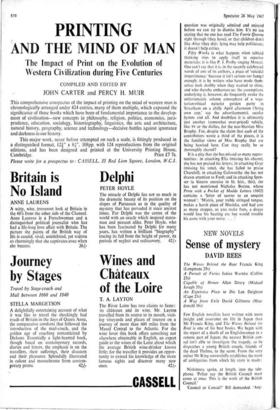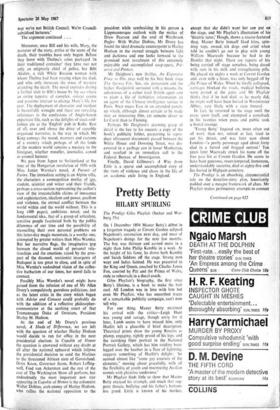NEW NOVELS
Sense of mystery
DAVID REES
The Waves Behind the Boat Francis King (Longmans 25s) A Pursuit of Furies Janice Warnke (Collins 25s) Capable of Honor Allen Drury (Michael Joseph 35s) An Expensive Place to Die Len Deighton (Cape 21s) A Way from Exile David Gillmore (Mac- donald 16s) Few English novelists have written with more insight and assurance on life in Japan than Mr Francis King, and The Waves Behind the Boat is one of his best books. We begin with the report of a death of an Englishwoman in a remote part of Japan; the nearest British con- sul isn't able to investigate the tragedy, so he dispatches a young British couple, friends of the dead Thelma, to the scene. From the very outset Mr King successfully establishes the maze of ambiguities from which his story is made: Nishimura spoke, at length, into the tele- phone. 'Police say the British Council must come at once. This is the work of the British Council.'
'Council or Consul?' Bill demanded. 'Any- way we're not British Council. We're Council- subsidised lecturers.'
The argument continued . . .
Moreover, once Bill and his wife, Mary,sthe narrator of the story, arrive at the scene o the death, their troubles have only begun. Before they leave with Thelma's ashes packaged 'in their traditional container' they have met not only an enigmatic chief of police, but Bibi Akulov, .a rich White Russian woman with whom Thelma had been staying when she died, and who only increases the sense of mystery attending the death. The novel explodes during a further visit to Bibi's house by the sea where an entire tapestry of complex, sinister events and passions interact to change Mary's life for ever. The deployment of character and incident is beautifully wrought and there are revealing references to the confusions of Anglo-Saxon expatriate life, such as the delights of steak-and- kidney pie at the 'English' pub in Kobe. Best of all, over and above the drive of superbly organised narrative, is the way in which Mr King conveys the mood, manners and customs of a country which perhaps of all the lands of the modern world remains a mystery to the foreigner, whether traveller, journalist, consul or council lecturer.
We pass from Japan to Switzerland at the time of the Hungarian revolution of 1956 with Miss Janice Warnke's novel, A Pursuit of Furies. The immediate setting is an Alpine villa, the characters a cosmopolitan motley of spy, student, scientist and writer and their friends, perhaps a cross-section representing the author's view of the irreconcilable claims of innocence and sophistication, idealism and power, pacifism and violence, the eternal conflict between the world within and the world without. This is a long (400 pages), ambitious novel, and its fundamental idea, that of a group of articulate, sensitive people fascinated both by the public dilemmas of our time and the possibility of reconciling their own personal problems on this latter-day magic mountain, is a worthy one, attempted by greater writers than Miss Warnke. But her narrative flags, the imaginative gap between the closed world of personal rela- tionships and the emotions raised by the pros- pect of the doomed, revisionist insurgents of Budapest is too great to close, and in spite of Miss Warnke's undoubted vision of the collec- tive barbarism of our times, her novel fails to connect.
Possibly Miss Warnke's novel might have gained from the infusion of one of Mr Allen Drury's compulsively garrulous politicians, just as the latest crisis in the story which began with Advise and Consent could probably do with the addition of a reflective philosopher- commentator at the seething court of that Trumanesque Duke of Omnium, President Harley M. Hudson.
At the end of Mr Drury's previous novel, A Shade of Difference, we are left with the question of whether Harley Hudson would decide to run for office in the next presidential election; in Capable of Honor the question is answered without any doubt at all after the national, upheaval which follows the presidential decision to send the Marines to the threatened African state of Gorotoland. Orrin Knox, Governor Jason, Robert Leffing- well, Fred van Ackerman and the rest of the cast of The Washington Show all perform, but undoubtedly the most important new star appearing in Capable of Honor is the columnist Walter Dobius, arch-enemy of Harley Hudson, who rallies the national opposition to the president while synthesising in his person a Lippmannesque outlook with the malice of Drew Pearson and the soul of Westbrook Pegler. With Walter Dobius, Mr Drury has found the ideal dramatic counterpoint to Harley Hudson in the eternal struggle between light and darkness and one looks forward to the promised next instalment of this extremely enjoyable and accomplished soap-opera, Pre- serve and Protect.
Mr Deighton's new thriller, An Expensive Place to Die, may well be his best book since The l peress File. Sex, sin, perversion and the higher Realpolitik surround with a miasma the adventures of a rather tired British agent sent to plant a file of forbidden information on an agent of the Chinese intelligence service in Paris. West meets East in an extended punch- up which, although almost certain to be made into an interesting film, yet remains closer to Le Carre than to Fleming.
Perhaps Mr Deighton's alarming grasp of detail is the key to his success; a copy of the book's publicity folder, purporting to repro- duce ultrasecret documents passed between the White House and Downing Street, was dis- covered in a garbage can in lower Manhattan, and resulted in an immediate call to the Federal Bureau of Investigation.
Finally, David Gillmore's A Way from Exile is a, sparse and accomplished story of the roots of violence and chaos in the life of an academic exile living in England.



































 Previous page
Previous page